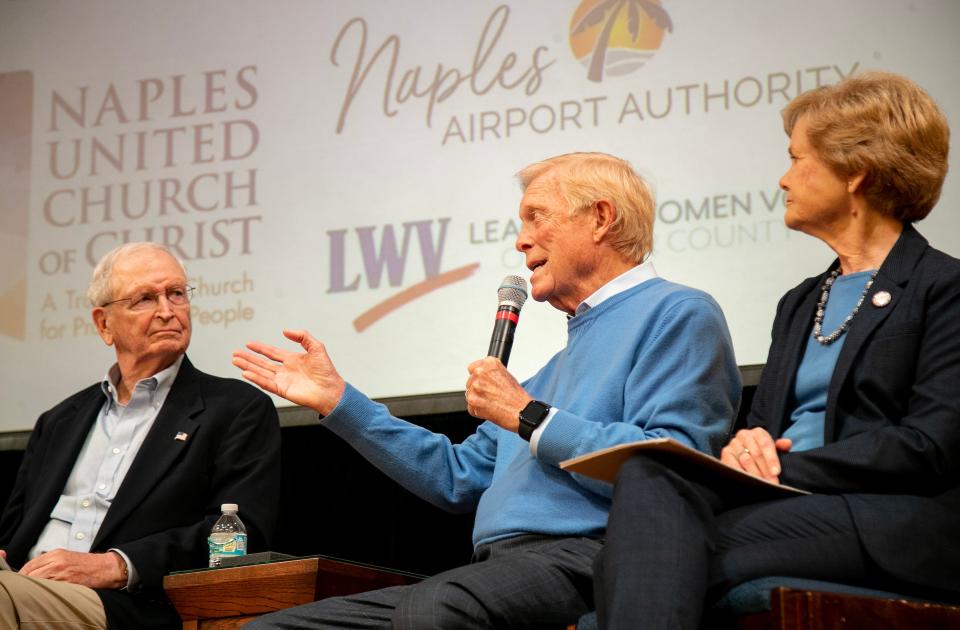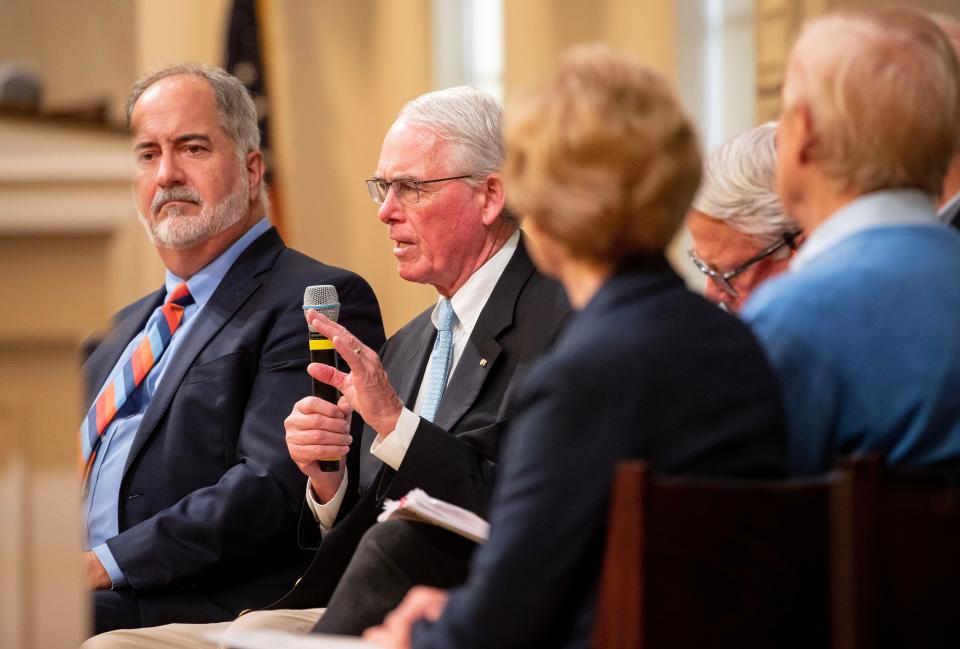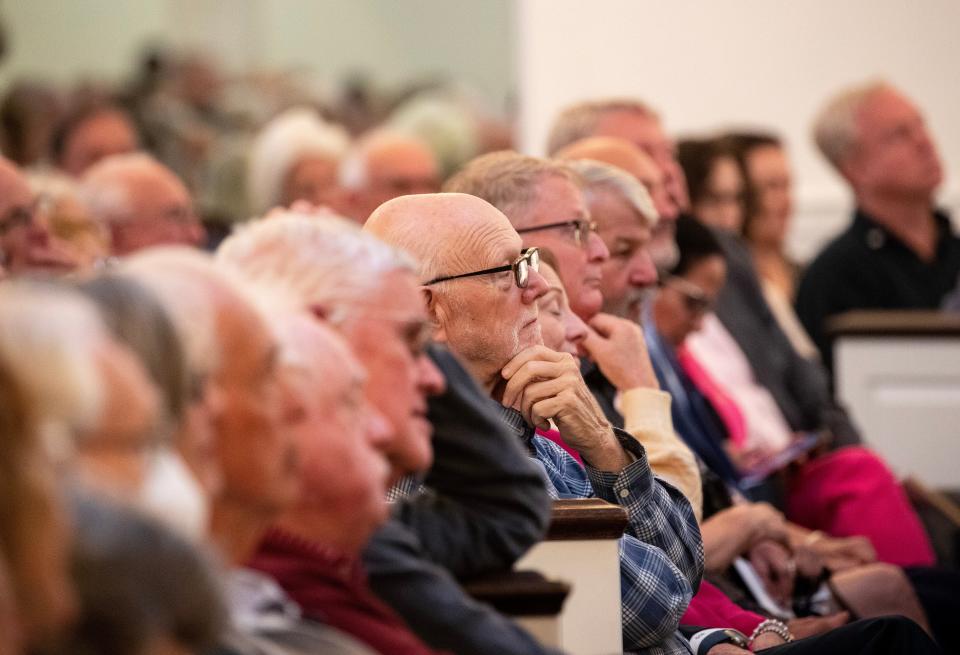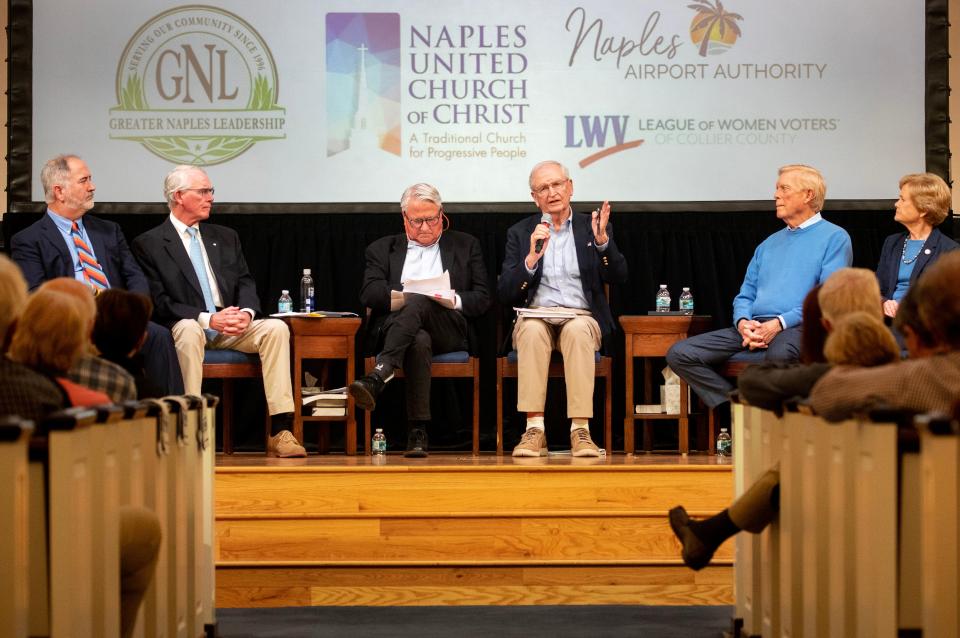Has civility disappeared in political discussion and government?
- Oops!Something went wrong.Please try again later.
Have Americans thrown out The Golden Rule: treat others as you want to be treated?
It seems so: That was the conclusion at a panel of former elected officials, a retired newspaper publisher, an advertising executive and a minister who discussed civility and rancor in the United States during a Greater Naples Leadership forum Wednesday at the Naples United Church of Christ.
"I think our democracy is in real trouble," said Dick Gephardt, a former Democratic U.S. congressman from Missouri who lives in Naples and Washington D.C.. "So many Americans hate so many other Americans because they disagree so violently on so many issues."

"What do the foreign countries that like us and worse the foreign countries that don’t perceive" when they see the fighting and arguing and inability to meet common ground on topics including U.S. speaker of the house, immigration and border control, asked Francis Rooney, a former Republican U.S. congressman who lives in Naples.
"I don’t think anybody fears us because they don’t think we can work our way out of a wet paper bag," Rooney said.

Whether it's national politics, a conversation with your neighbor, a city council meeting or a holiday dinner with family, Americans seem to have trouble communicating respectfully, listening to differing options and finding common ground. The polarization of America is a topic in national and international news. The panel at Greater Naples Leadership's "Reduce the Rancor" forum, attended by 687 people, discussed causes and ideas for a cure.

Mark Williams, Naples United Church of Christ senior minister, said the attendance figure "shows the amount of interest in the topic in our community."
The church's Justice Committee thought it would be a "forum that would really connect with our faith virtues."
Insulting a person with a different opinion
"Insulting somebody who you are trying to see things your way is an interesting strategy. How’s that working for you?" said Andy Solis, a former Collier County commissioner. "As soon as something becomes personal it takes it out of the issues and makes it a personal thing. And I think that gets in the way of discussing what the issues really are."
An overloaded Internet; social media; artificial intelligence infiltration by special interest groups and foreign countries; and a failure to listen to one another were among the main reasons the panel blames for American rancor.
Gephardt said after the printing press was invented, people wondered where information came from and could it be trusted.
"Then we came up with a new profession – called journalism. We trained people to become journalists. How to report facts so they are valid, and believable and trustable," he said. "Now we have the Internet and 4.5 billion people on Earth are all journalists now. How did that work out?"
Knowing what's factual and what's not takes work
How to discern between "factual news" and "fake news" is to go to still-trusted sources, whether it is a local newspaper or national news such as BBC, The Economist, The Washington Post or The New York Times, which are "very factual," said Nick Penniman, retired newspaper publisher and lead director of NewsGuard, a company of journalists that "provides transparent tools to counter misinformation for readers, brands, and democracies."
"If you want balance, unfortunately you have to look beyond some of the media in this country," Penniman said. "Maybe you go to opinion section and you say that’s polluting the news. That is not polluting the news."
Tim Love, author of "Discovering Truth: How to Navigate Between Fact & Fiction in an Overwhelming Social Media World," said to triangulate when reading or watching news, meaning, read or watch at least three different news reports.
"We can’t be afraid to rethink our beliefs – that’s called learning," Love said.

Gephart and Rooney talked about legislative reforms to make social media companies responsible for what gets posted on their platforms.
"It’s a hate machine. And we have to deal with it. In my view, it threatens humankind, and it threatens certainly our ability to have a democracy," Gephardt said. "Just like newspapers get sued for causing harm when they know better," Americans need to have the ability to sue social media platforms.
All the panelists agreed that humans need to slow down and listen and take responsibility for their actions as well.
"I believe that civil discourse requires that we have some very specific similar values," said Sharon Harris-Ewing, a minister with the Interfaith Alliance of Southwest Florida.
Those values are an affirmation in the fundamental value of every person, she said, including a curious and open mind; an open heart, which means to strive to practice humility; and valuing the process of relationships with people different from them.
"I have to maintain a humble stance. As has been said, I don’t know everything. I’m not always right," Harris-Ewing said. "I can learn from you even if I disagree. But if I believe I’m always right, I might appear to listen, but I’m not trying to understand or connect, I’m just waiting for you to finish."
It's not just about being polite, she said, adding she has been at plenty of public meetings and events where "people were polite but there was no listening."
Asked about acts of antisemitism in the country, Harris-Ewing said it's unacceptable.
"Fundamental for me – respect for varied religious traditions. I would state my faith is no better than yours," she said, adding that "acts of antisemitism are increasing in this country and in this community in particular."
"We can disagree, but you may not attack or denigrate or put down the religion of another person," she said. "We can disagree but we have to respect one another’s faith."
Do unto others as you would have done to you
Getting back to The Golden Rule is key, the panel agreed.
Gephardt said: "When I was 5 in St. Louis, my mother used to get down on her knees and say to me, 'Dick, treat other people the way you would like to be treated. Before you say anything to anybody, think how you would like it said to you. Think about how you would like it done to you.
"She said Dick, love your enemies as much as you love yourself. Always be humble because you deserve to be."
Gephardt also pointed out a comment by Democratic-Republican President-to-be Thomas Jefferson in 1787, when he was minister to France.
"Someone once asked Thomas Jefferson if he had to choose between government and newspapers. He said give me newspapers. Because those trying to govern themselves needed to have valid, factual, true information – so information is everything," Gephardt said.
Jefferson wrote: "The basis of our governments being the opinion of the people, the very first object should be to keep that right; and were it left to me to decide whether we should have a government without newspapers or newspapers without a government, I should not hesitate a moment to prefer the latter. But I should mean that every man should receive those papers & be capable of reading them."
This article originally appeared on Naples Daily News: Forum: Has civility disappeared in political discussion and government?

